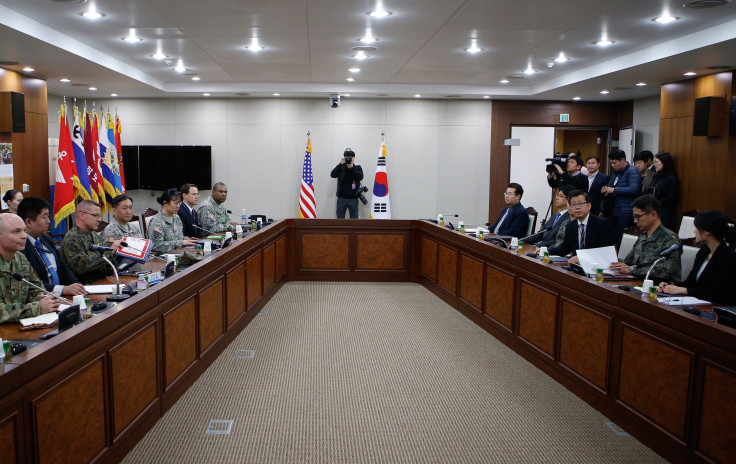South Korea In Talks With Trump? Seoul Discussing Foreign Policy With US Presidential Candidates

South Korean leaders have been monitoring and contacting American presidential hopefuls to talk about foreign policy ahead of the November election, state news service Yonhap reported Tuesday. And, yes, Donald Trump is among them.
"Our government contributes to and plays a role in maintaining and strengthening the South Korea-U.S. joint defense posture and creating stable conditions for the stationing of U.S. forces in Korea," Cho June-hyuck, South Korea's deputy minister for public relations, said during a recent news briefing. "We have made and will continue to make outreach efforts to the campaigners of key candidates, including Mr. Trump, to learn about their policies on the Korean Peninsula and deliver our positions on foreign policy issues."
There are about 30,000 American soldiers stationed in South Korea, where tensions remain high today despite a 1953 truce between the country and its northern neighbor. An additional 47,000 U.S. troops are in Japan, according to Agence France-Presse.
For years, Trump has alleged the U.S. gets "practically nothing" in return for its threatening presence, though that's not quite true — Politifact reported in January that South Korea pays more than $866 million a year in the arrangement. His candidacy has alarmed some South Koreans, especially given his suggestion to the New York Times this week that the nation and Japan should defend themselves if they won't pay more, even if that leads to nuclear warfare.
“We are dumbfounded at such myopic views of a leading candidate in the U.S. presidential race, who tries to approach such critical issues only from the perspective of expenses,” South Korean newspaper JoongAng Ilbo wrote in an editorial, according to the Washington Post. “Trump must refrain from his penny-wise and pound-foolish approach.”
Other candidates have also been vocal about foreign policy when it comes to the Koreas, though their hasn't been such outcry about their stances. Sen. Ted Cruz, R-Texas, said last month that the U.S. needed to "harden the grid to defend ourselves," including missile defenses to hit back at North Korea. Ohio Gov. John Kasich told Fox News in January that he would handle North Korean aggression by quarantining the country.
On the Democratic side, front-runner Hillary Clinton released a statement supporting Seoul and Japan earlier this year when North Korea conducted an apparent nuclear test there, writing that "we will take whatever steps are necessary to defend ourselves and our treaty allies." Challenger Sen. Bernie Sanders, I-Vt., "believes that the test of a great and powerful nation is not how many wars it can engage in, but how it can resolve international conflicts in a peaceful manner," according to his website.
© Copyright IBTimes 2025. All rights reserved.






















